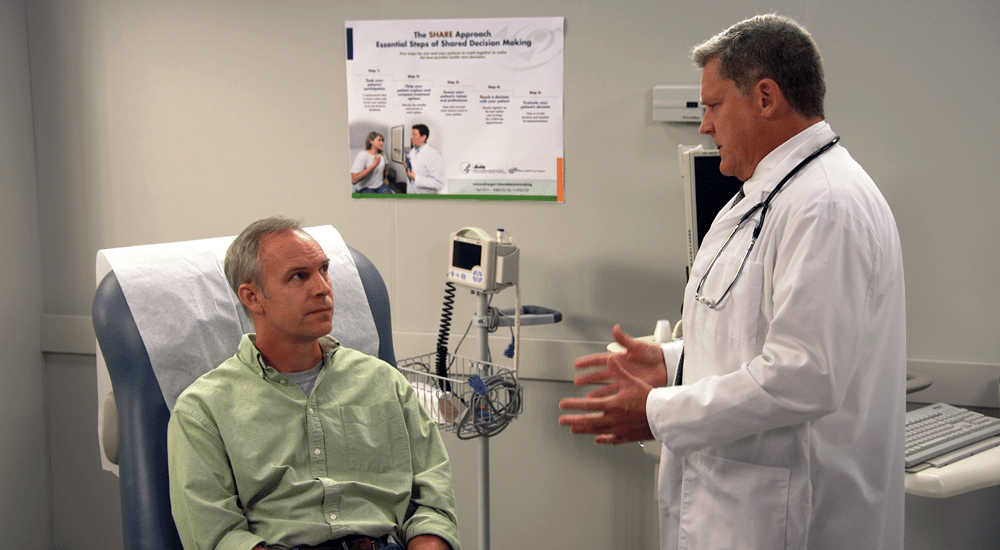Diabetes affects an estimated 30.3 million people in the United States or about 9.4 percent of the population.
Patients with diabetes have a lot to manage to stay healthy – paying close attention to their diet, making sure they get plenty of exercises, often managing multiple medications, and ensuring their numbers (blood glucose, blood pressure, and cholesterol) are within their goal range. It is important for patients with diabetes to be active members of their health care team and have a voice and ownership in the decisions made about their care.
A Shared Decision Making (SDM) encounter occurs when the patient, his loved ones and the health care team discuss together what treatment options best address the patient’s goals. Managing diabetes on a day to day basis is a family affair. The decision-making process takes into account evidence-based information about available options, the health care team’s knowledge and experience, and the patient’s values and preferences.
Watch the low blood sugar video:
Important role of Shared Decision Making
In 2017, Department of Veterans Affairs and the Department of Defense recognized the important role SDM plays in managing diabetes when they updated their Clinical Practice Guideline for the Management of Type 2 Diabetes Mellitus in Primary Care.
The guideline stated that “when properly executed, SDM may decrease patient anxiety, increase trust in clinicians, and improve treatment adherence.” Improved patient-clinician communication can be used to convey openness to discuss any future concerns.
Agencies across the federal government encourage the use of SDM…in treating patients with diabetes.
The Agency for Healthcare Research and Quality (AHRQ) is a national leader in SDM, offering the SHARE Approach model and curriculum for training clinicians to implement SDM in practice using a team-based approach. SHARE is a major component of a Federal Interagency Workgroup to improve hypoglycemic safety in support of the National Action Plan for Adverse Drug Event Prevention.
Led by the Department of Health and Human Services Office of Disease Prevention and Health Promotion, agencies across the Federal Government are working to encourage the use of SDM and related principles such as health literacy and numeracy in treating patients with diabetes.
Tool helps to prevent hypoglycemic events
The Veterans Health Administration (VHA), the Department of Defense and the Indian Health Service recommend AHRQ’s SHARE Approach as a tool to be used by clinicians to assist patients in developing individualized glycemic goals to prevent hypoglycemic events.
VHA has developed a national voluntary program, the Choosing Wisely Hypoglycemic Safety Initiative to identify Veterans at high risk for hypoglycemia who may be overtreated with hypoglycemic agents at the time of a clinical visit based upon a clinical reminder in the electronic medical record.
The VA Employee Education System has partnered with AHRQ to develop a series of videos for patients, their families, and all clinicians to increase awareness of hypoglycemia and the importance of using shared decision making in discussing treatment goals with their healthcare team.
They will be shown on closed-circuit televisions in VA waiting rooms across the country and are available to the public. The SHARE Approach curriculum and materials have also been adapted for use in the VA’s online education platform.
Diabetes and complications such as low blood sugars can be difficult for a patient and his or her family. Applying SDM principles to managing diabetes can help care teams be more responsive to a patient’s situation, needs, and preferences while putting them directly at the center of their care.
November is National Diabetes Month.
About the author: Dr. Brian Burke is an internal medicine physician at the Dayton VA Medical Center.
Topics in this story
More Stories
Study underscores important role COVID vaccination can have in protecting Veterans from infection and reducing long-term health consequences
Columbia VA’s robotic surgery teams completed their 800th robotic surgery and are on schedule to hit 1,000 by the end of the year.
In a decentralized clinical trial, Veterans can participate from their own homes or local VA instead of having to travel to a research site.








That’s funny, I had a nurse practitioner but me on a second med for my diabetes, then got a new primary care provider who said I was no longer a diabetic. Then was in ER a month later with my blood sugar at 262. I than got another primary care provider who took me off my blood pressure medication to then be in ER for 6 hour’s with 150/120 and pulse rate over 140. Then ER put back on my medication, but put me at twice the dose. Had mental health provider take me off my lorazapan. I went manic and was voilent and my wife of 30 plus years left me. This is all due to being on choice have 600 dollars of out of pocket meds, and was denied reimbursement. I went to lvmc so I wouldn’t have to pay for them and they changed my treatment plan to there opinions. This is the same VA that treated my brother who delayed his chemotherapy and radiation by 8+ weeks after cut out all his teeth and putting in feeding tube because a dental clerk didn’t know how to look up his dental consult. He’s dead now. What a BS story or is a puff piece.
health talk is always good for us..